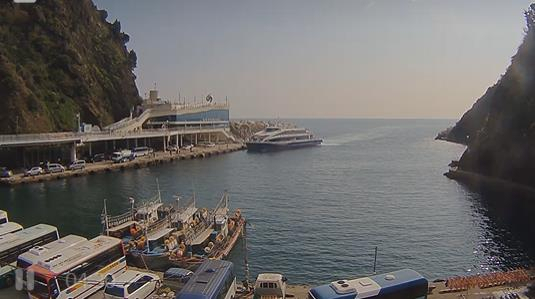‘NK’s provocative missile launch over NLL backed with confidence over its nuke capability’
By Jo He-rimPublished : Nov. 2, 2022 - 15:41

North Korea's latest firing of more than 10 ballistic missiles, one of which landed south of the de facto maritime border for the first time, reflects the regime's confidence in its military capabilities and its determination to cement its status as a nuclear-armed state, Seoul-based experts said on Wednesday.
The short-range ballistic missile that crossed the Northern Limit Line fell into the high sea 57 kilometers east of South Korea’s eastern city of Sokcho and 167 km northwest of Ulleung Island near Dokdo, according to South Korea’s Joint Chiefs of Staff.
Experts viewed the unprecedented provocation as a possible "prelude" to further raise military tensions in the region before North Korea carries out its seventh nuclear test.
"(Wednesday’s missile launches) are an act of assurance that the United States and South Korea cannot counteract when (North Korea) takes provocative actions with its capability in operating its tactical nuclear weapon the regime manifested from Sept. 25 and onward,” Park Won-gon, a professor in the department of North Korean studies at Ewha Womans University said.
The North is also showing its determination that it will not “zig-zag” with its absolute goal for international recognition as a nuclear-armed state, according to Park.
“North Korea was provoking when China had just kicked off its 20th National Congress of the Chinese Communist Party (last month), and it is also showing that does not care about South Korea’s situation, as the country is wrapped in grief from the recent Itaewon disaster," Park said.
Park also likened the situation on the Korean Peninsula to the stability-instability paradox of India and Pakistan. Theoretically, when two countries have nuclear weapons or such capabilities for mass destruction, the probability of a direct war goes down, but minor or indirect conflicts increase.
North Korea will likely to continue to ratchet up military tension on the Korean Peninsula, as it would want to cement its status as a nuclear-armed state, with its seventh nuclear test as a finale. Pyongyang would then want to lead negotiations directly with the US, holding its status as a nuclear-armed state, experts said.
Echoing this view, Yang Moo-jin, a professor at the University of North Korean Studies in Seoul, said Pyongyang may be showing that its recent passage of a new law to declare its nuclear status as "irreversible" is not empty talk.
The North's latest provocation came as Seoul and Washington stage the Vigilant Storm exercise involving more than 240 aircraft in a bid to bolster a deterrence posture against Pyongyang's military threats.
As the South Korea-US joint exercise began Monday, the North warned that it would take "stronger countermeasures," issuing strong criticisms against the allies.
Before its missile launches on Wednesday, Pak Jong-chon, Secretary of the Central Committee of the North's ruling Workers' Party, issued a statement to urge Seoul and Washington to stop "military provocation" against Pyongyang, and that the allies will pay a "terrible price" if they decide to attack the North.
The North Korean Foreign Ministry also said it will consider taking "next level countermeasures" if the US continues with its "military provocation" in a statement. The North has stated previously that it views joint military exercises between the US and South Korea, which involves the US' strategic assets, as intending to undermine its military capabilities.
By Jo He-rim (herim@heraldcorp.com)







![[Graphic News] More Koreans say they plan long-distance trips this year](http://res.heraldm.com/phpwas/restmb_idxmake.php?idx=644&simg=/content/image/2024/04/17/20240417050828_0.gif&u=)
![[KH Explains] Hyundai's full hybrid edge to pay off amid slow transition to pure EVs](http://res.heraldm.com/phpwas/restmb_idxmake.php?idx=644&simg=/content/image/2024/04/18/20240418050645_0.jpg&u=20240419100350)






![[From the Scene] Monks, Buddhists hail return of remains of Buddhas](http://res.heraldm.com/phpwas/restmb_idxmake.php?idx=652&simg=/content/image/2024/04/19/20240419050617_0.jpg&u=20240419175937)

![[KH Explains] Hyundai's full hybrid edge to pay off amid slow transition to pure EVs](http://res.heraldm.com/phpwas/restmb_idxmake.php?idx=652&simg=/content/image/2024/04/18/20240418050645_0.jpg&u=20240419100350)

![[Today’s K-pop] Illit drops debut single remix](http://res.heraldm.com/phpwas/restmb_idxmake.php?idx=642&simg=/content/image/2024/04/19/20240419050612_0.jpg&u=)